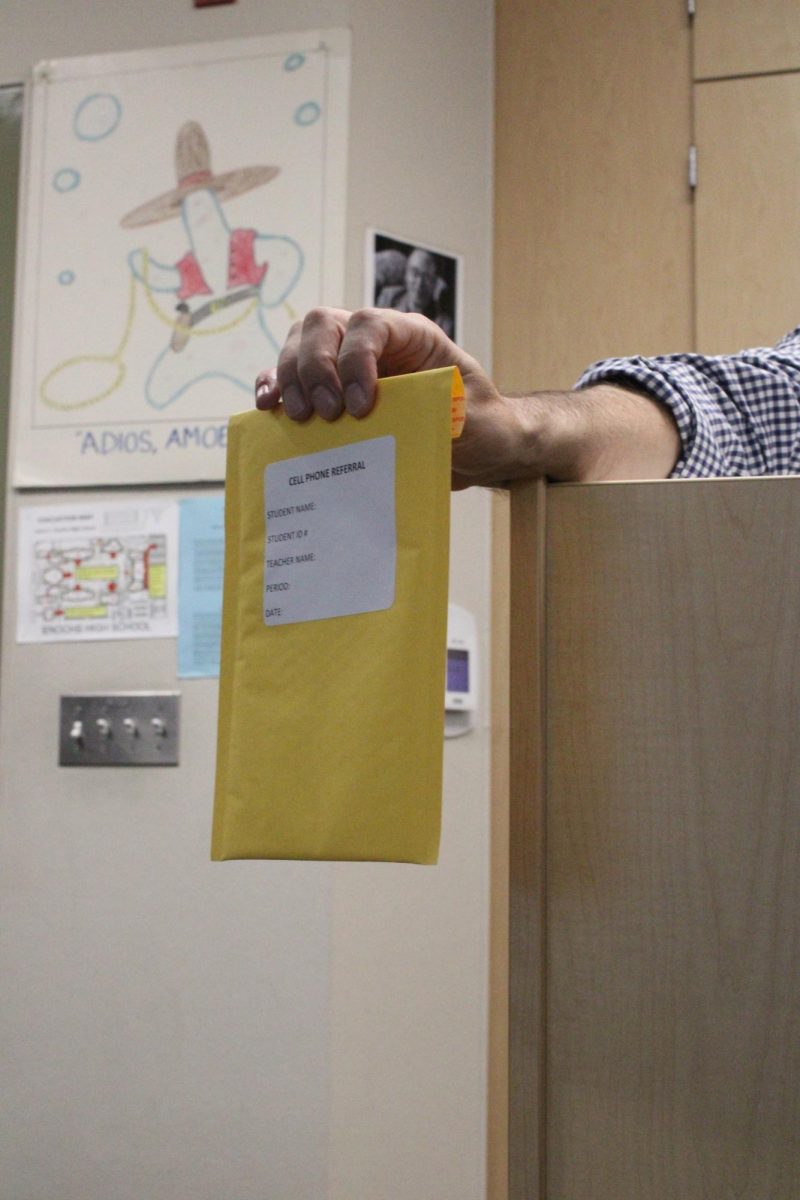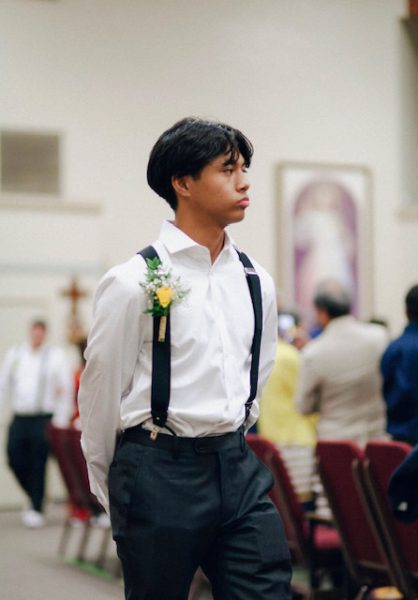The new phone policy, one of current controversy amongst many students, is also affecting teachers. With many years of handling issues with students and their phones in their tool belt, teachers have their opinions too.
What was your classroom policy/how did it change with the new policy?
Each teacher had their own policy prior to this new one, a policy that suited their classroom and their students. Following the new policy, some teachers are choosing to maintain their past phone policies while some are wholeheartedly embracing the new policy.
Michelle Schilperoort, FFA Advisor and teacher of Ag Business, Ornamental Horticulture, Greenhouse Management, and Agriscience Systems Management, was asked what her previous classroom policy relating to phones was. She replied, “Last year I was pretty loose because I have many many repeating students, so pretty much just giving them a look or asking them to put it away would be all that was necessary…”. Now considering the new policy, Mrs Schilperoort followed with, “This year obviously towing the line with the rest of the staff and supporting people who have had a more difficult time, the new policy is totally in effect”.
Mrs. Dodds, member of Site Leadership and Honors Precalculus, AP Calculus, and Honors Algebra 2 teacher, kept her phone policy short and sweet, “No cell phones. I don’t touch mine and I expect that they don’t touch theirs”, noting how “the only time they use their phones is to take pictures of notes occasionally”. Generally, she says that she “gives students 2-3 minutes at the end of class to take out their phones, so they have that time to themselves after instruction”.
How many times do you encounter an issue with a student on their phone?
Encountering students on their phones during class ranges from teacher to teacher, class to class. Some teachers rarely encounter issues while some handle them every class period, giving each teacher their own personal perspective on the new policy and issues at hand.
When asked about how many times they encounter an issue with a student on their phone, Mr. Bankson responded, “All the time, probably 5 or 6…7, 8 times a period. It’s pretty frequent.”
Another teacher on Site Leadership, freshmen Honors and CP English teacher Mr. Hayden described that he encounters an issue with a student and their phone “fairly frequently, especially towards the end of the year”; although, “they are more compliant since they’re still scared a little bit”. Despite that, “there are issues everyday in every class period”.
How many times a day do you check your phone?
Many teachers hold students to specific standards, while they hypocritically do not follow them themselves. If teachers want students to follow the policy set out for them, setting a good example would drastically change both the learning environment and the students’ amount of screen time in class.
Mrs. Dodds said that she rarely touches her phone during the school day. “Sometimes I don’t at all. When I get to school, I get my computer out and I leave it in my bag”. Additionally, she notes “If there is something I am waiting for like an important phone call, then I will check it occasionally. However, day to day, from 7:15 am to 3:40 pm I do not touch my phone at all”.
When asked the same question to AP United States History teacher Mr. Carlin, he emphasizes that he is definitely “not as addictive as other people are.” Within school hours, Carlin says he will check his phone “maybe three or four times at the most”, unless something arises with his family or a serious issue then he “might check it more often”, but other than that, Carlin will leave his phone on silent to focus on the rest of his time at school. However, at home Carlin would say he checks his phone reasonably often, so it’s not like he is using his phone the same way in his work life compared to his personal life.
Do you like the new policy, or do you think there should be a different one?
Entering a new era with this phone policy, teachers’ have very interesting opinions on the policy itself and the issue with students at hand.
When asked about her opinion on the new policy, Mrs Schilperoort made a profound comment, expressing, “I think that’s super subjective and depends on the relationship that a teacher has with the students. If it is someone that has never met students, if it’s a freshman teacher, you gotta lay the hammer down. If it’s kids that are seniors that you’ve had for multiple years like in my case, there’s a much different level of respect and it’s not as necessary to be such the heavy”. Mrs Schilperoort’s comment provides a different perspective to the policy, bringing attention to the fact that it is necessary for certain teachers to be more strict, while it is easier to enforce for others.
Adding on with Schilperoot’s comments, Mr. Carlin also states that the cell phone policy varies from classroom to classroom. “What’s the climate of your classroom?” Carlin asks, sparking more questions on how teachers and students should be approaching this new policy. Does the class have appropriate times to use cell phones? Does it involve paying more attention to a more advanced and difficult material? Does the population of the class have a friendly relationship with the teacher? Carlin explains that the cell phone policy is really determined by what goes on in the classroom. This policy “varies a little bit from teacher to teacher” Carlin emphasizes in that the expectations of cell phones fall within the actions of both the students and the teachers. Carlin’s opinion of this new policy comes from his view on how diverse Enochs is when it comes to teachers and their mindsets on cell phones. But he does support and acknowledge this new policy, knowing that it’s much better than something that is “wishy-washy.”
How does the new policy affect you?
The new policy affects more than just students. The teachers, following the rules of the policy, must now take the phones from the students, fill out their information on the sealed envelope, and turn the envelopes to the administration office in their building. All of this requires teachers’ time and attention to further handle the students’ phones, unless of course they call in a Campus Supervisor to do it all for them.
Jake Bankson, a 9-12 mathematics teacher, here at Enochs High School was asked, “How does the new policy affect you”, to which he responded, “It affects me because it changed the way that I handled stuff, but the new policy isn’t really that bad.” Bankson also said, “The thing is, what I like about it is that it’s heavy handed at the beginning, right, you know after you see it, the teacher can take it and put it in the envelope and send it to the office. The second time in another class, then their parents gotta come pick it up.” Mr. Bankson’s quotes shine a positive light on the teachers’ perception of the new phone policy.
How strictly are you going to enforce the new policy?
With the administration offering this new support system for the teachers to handle students and their phones with, teachers can enforce the policy very strictly, or stick to what was working in the past. It truly depends on the teacher’s ability to hold their students accountable and the students to maintain the respect to go without their phones for the class period.
Mr. Hayden said he is going to enforce the policy “with complete and utter fidelity”. Through all of his years of teaching, “these things start small and by the end of the year, they are complete pandemonium”, noting how without the new phone policy, things can get out of hand.












